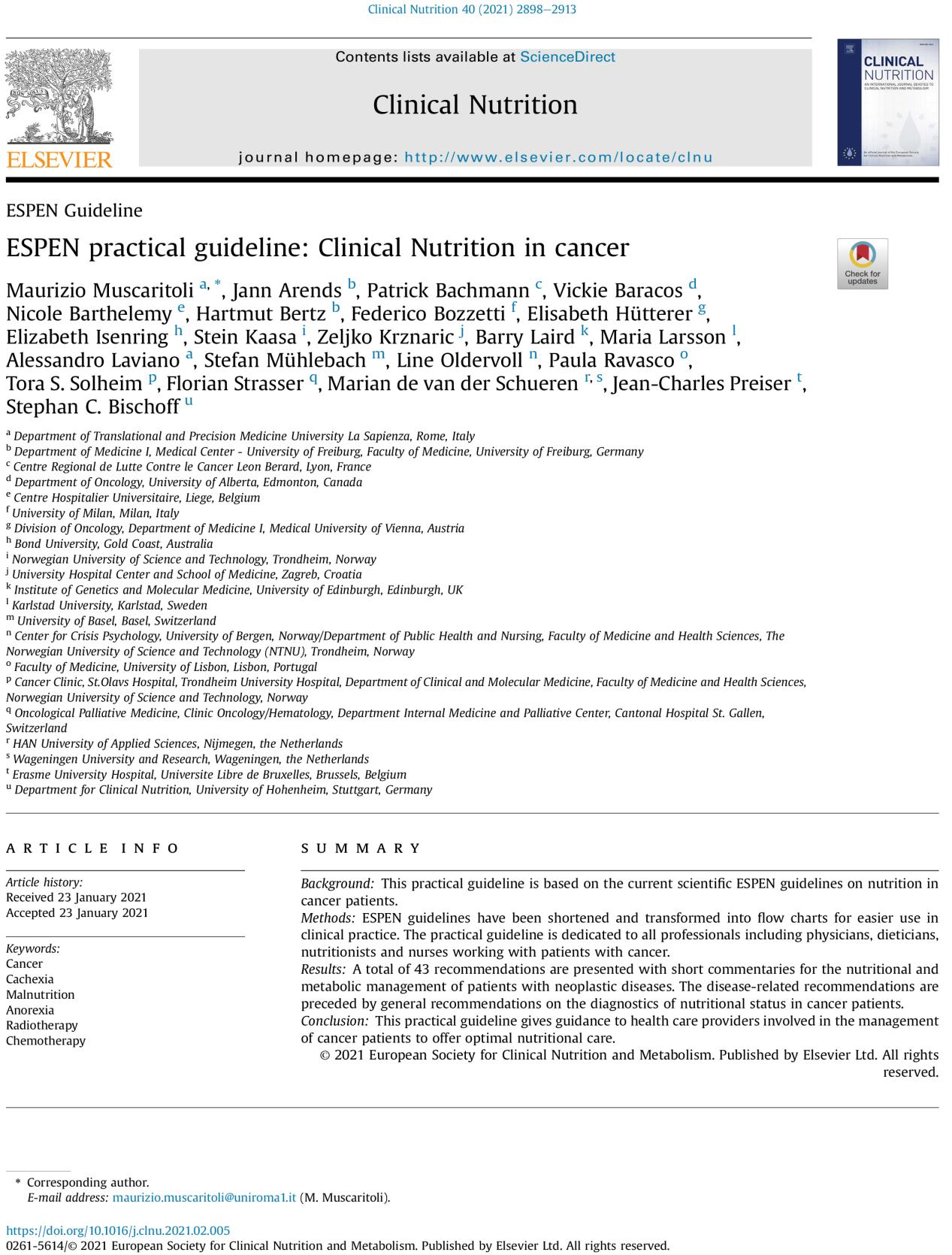Challenges and nutritional needs of cancer patients
Radiotherapy and surgery are important treatments for cancer patients to effectively control their disease. During long-term anti-cancer treatment, the toxicity of drugs, radioactivity and surgical trauma pose great challenges to patients' immune systems and normal body metabolism, causing a variety of complications such as infection, organ failure, stress metabolic disorders and reduced exercise capacity, leading to a dramatic decrease in survival and quality of life. At the same time mechanical ventilation and other necessary adjuvant therapies, also for can cause a series of complications. Therefore, immune components, energy substrates that can be efficiently utilized, and nutritional formulations that match the therapeutic means and condition can help cancer patients improve their quality of survival.
Nutritional Support for Patients with Cancer
ESPEN 2021 guidelines identify recommended intakes of key nutrients. The focus is on cancer diagnosis, nutritional screening, surgery, and drug therapy, and provides recommendations and guidance for improving the nutritional and metabolic management of patients.


Key nutritional recommendations for cancer patients
Obtain higher energy than normal requirements
Choose sources of nutrition that are used more by the body.
Use formulas with immune components
Coping with complications from cancer treatment
Advantages of Cancer Specific Disease Formulation
The scientific nutritional formula not only provides adequate nutrition for patients, but also matches the metabolic needs of the body during and after treatment, which enhances the therapeutic effect and reduces the pain of treatment caused by nutritional deficiency or metabolic disorders. Cancer specific disease formulas can provide:
Role of hydrolyzed whey protein
After anti-cancer treatment, patients' gastrointestinal motility function and gastrointestinal mucosal barrier function are significantly reduced, which reduces nutrient absorption and increases the incidence of intestinal-derived infection. Hydrolyzed whey protein is rich in short peptides, which can be efficiently absorbed by the intestine and rapidly repair the gastrointestinal mucosal barrier.
Role of ω-3 PUFAs
Studies have shown that ω-3 polyunsaturated fatty acids inhibit tumor cell growth by increasing cell membrane fluidity, anti-inflammatory activity, reducing the synthesis of pro-carcinogens (e.g. prostaglandin E2), and increasing intracellular reactive oxygen species levels (ROS), while also regulating inflammatory responses, reducing oxidative stress, and protecting immune function.
Conclusion
More and more people realize that the possibility of curing cancer is increasing with the development of technology, and that maximizing the maintenance of the patient's organism is the basic condition to ensure the effectiveness of anti-cancer treatment for patients. We hope that nutritional formulas suitable for cancer patients can help patients achieve a better life and exert more definite anti-cancer therapeutic effects and prolong survival time.
【1】Federico Bozzetti,Alastair Forbes. The ESPEN clinical practice guidelines on Parenteral Nutrition: Present status and perspectives for future research[J]. Clinical Nutrition,2009,28(4).
【2】Muscaritoli Maurizio,Arends Jann,Bachmann Patrick,Baracos Vickie,Barthelemy Nicole,Bertz Hartmut,Bozzetti Federico,Hütterer Elisabeth,Isenring Elizabeth,Kaasa Stein,Krznaric Zeljko,Laird Barry,Larsson Maria,Laviano Alessandro,Mühlebach Stefan,Oldervoll Line,Ravasco Paula,Solheim Tora S.,Strasser Florian,de van der Schueren Marian,Preiser Jean-Charles,Bischoff Stephan C.. ESPEN practical guideline: Clinical Nutrition in cancer[J]. Clinical Nutrition,2021,40(5).
【3】A.Kok,N. Doornink,M.P. Ariëns,S. Beijer,M.G.A. van den Berg,H. Jager-Wittenaar,R. van Lieshout,B. Sytema,M.R. van Veen,J.J.L. Breedveld-Peters. SUN-P082: Comparison of the “ESPEN Guidelines on Nutrition in Cancer Patients 2016” with the Recommendations of the Dutch Dietitians in Oncology Group[J]. Clinical Nutrition,2017,36.
 Consult us
Consult us